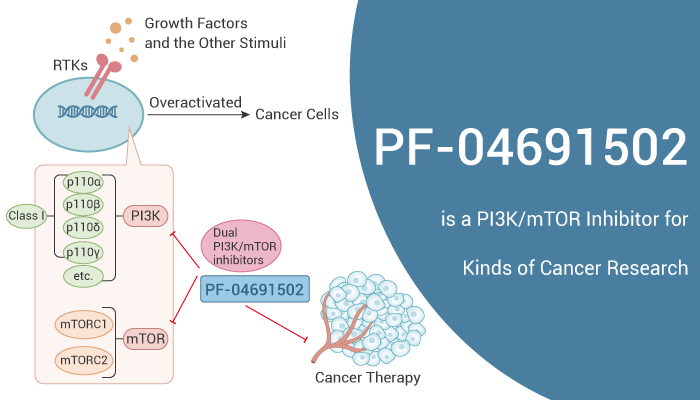The PI3K/AKT/mTOR (PAM) signaling pathway is a highly conserved signal transduction network in eukaryotic cells that promotes cell survival, growth, and cell cycle progression. Specifically, it composes two parts: PI3K and its downstream molecule AKT. Besides, PI3K/Akt/mTOR responds to the availability of nutrients, hormones, and growth factor stimuli. Moreover, it plays a very important role in the growth and proliferation of tumor cells. The core role in this pathway is played by PI3K heterodimers, which belong to the PI3K IA class. The growth factor signaling of transcription factors in the PAM axis is highly regulated by multiple cross interactions with several other signaling pathways. Moreover, the dysfunction of signal transduction may lead to the occurrence of cancer. Meanwhile, the PAM axis is the most commonly activated signaling pathway in human cancer, typically associated with resistance to anticancer therapy. Let’s study the potent PI3K/mTOR inhibitor, PF-04691502.
PF-04691502 is a PI3K/mTOR Inhibitor for Kinds of Cancer Research.
Firstly, PF-04691502 is an orally active, potent and selective inhibitor of PI3K and mTOR. Nonetheless, PF-04691502 binds to human PI3Kα, β, δ, γ and mTOR with Kis of 1.8, 2.1, 1.6, 1.9 and 16 nM, respectively. Obviously, PF-04691502 potently inhibits AKT phosphorylation on S473 and T308 in all the 3 cancer cell lines. PF-04691502 potently inhibits mTORC1 activity with an IC50 of 32 nM. PF-04691502 inhibits cell proliferation of BT20, SKOV3, and U87MG.
Secondly, PF-04691502 significantly reduced the phosphorylation of AKT and S6RP at 4 hours after a single dose of 10 mg/kg. Particularly, PF-04691502 causes dose-dependent tumor growth inhibition (TGI) in the U87MG xenograft model.
Finally, PF-04691502 is an orally active, potent and selective PI3K/mTOR inhibitor and used for kinds of cancer research.
References:
[1] Yuan J, et al. Mol Cancer Ther. 2011 Nov;10(11):2189-99.
